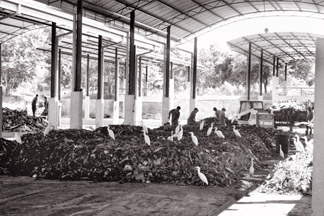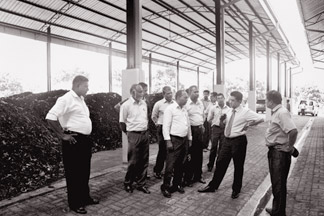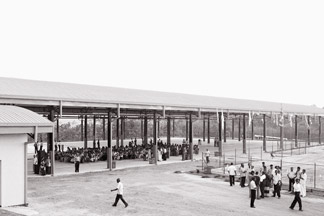Over 100 LG bodies to support waste management
By Dhaneshi YATAWARA
|

Compost manufacturing site
|
Disposal of solid waste has become one of the major environmental
issues in Sri Lanka. The most common being open dumping of garbage.
Dumping of garbage on the road sides and in prohibited areas such as
wetlands, marshy lands is a common practice.
In view of the various environmental problems arising out of
inadequate clearing of waste management services by the relevant
agencies the need for a national approach to handle this serious matter
was becoming important. Thus, the National Policy for Solid Waste
Management was established under the purview of environmental
authorities. Yet the attitude of some in waste disposal and the
difficulties faced by the relevant local authorities remained. Finding
suitable land was a perennial problem for the local authorities.
According to the provisions in the Local Government Act, the local
authorities are responsible for collecting and disposal of waste
generated by the people within their jurisdiction. In most of the
urbanized municipalities MSW management is one of the largest employers
of labour. The lack of technical knowledge among the authorities was
another problem. Public protests against earmarked lands to be developed
as dumping sites and financial problems were among the key issues local
authorities continue to face.
The ‘Pilisaru’ National Solid Waste Management Program under the
Central Environment Authority (CEA) has been articulated to translate
the National Policy into action. Particularly its main objectives which
are identified as -
(a) Ensure environmental accountability and social responsibility of
all waste generators, waste managers and service providers
(b) Actively involve individuals and all institutions in integrated and
environmentally sound solid waste management practices
(c) Maximise resource recovery with a view to minimize the amount of
waste for disposal
(d) Minimise adverse environmental impacts due to waste disposal to
ensure health and well-being of the people and on ecosystems.

CEA Chairman Charitha Herath inspecting the site |
 |
| The recycling
site |
It was identified properly controlled composting helps to minimise
the social cost involved in poor solid waste management. On the other
hand, agricultural lands in Sri Lanka face the problem of low
productivity due to soil erosion and the need for natural fertilisers
like compost has become essential in replacing the loss. It is very
important to separate waste at the source of generation to different
components to facilitate subsequent waste management practices,
especially recycling. In order to find a solution to all these problems
the Central Environment Authority brought in a new mechanism to
financially and technically support the local authorities to bring about
a solution to this health hazardous problem. The CEA plans to include
100 new local authorities in 2012 to control the solid waste management
at local levels. "The solid waste management program received additional
funds from the Government to implement program this year,” CEA Chairman
Charitha Herath said.
“Our aim is to create a waste-free country. The most practical
solution to degradable solid waste is to create compost out of it which
could be used for agriculture,” he said. Municipal councils should pay
more attention to this project and consider it as a top priority,
especially since the CEA is assisting the councils to find a substantial
solution to waste management. “However, most municipal councils or
Pradeshiya Sabhas face issues concerning the purchase of land and space
for the proper management of waste collected, as a result of which such
priorities tend to be neglected,” he added.
The CEA, under the Pilisaru project implemented a technically
advanced garbage recycling project at Rajgama, Galle recently at a cost
of Rs. 85 million. This facility serves seven local bodies in the Galle
district. “The plant has the capacity to recycle approximately 50 tons
of garbage a day,” said N. S. Gamage, Director of the Pilisaru project.
The waste is sorted as degradables and non-degradables. This is done
while the garbage is on the conveyor belt and the non degradable waste
is removed and collected separately.
The garbage that is moved on the conveyor belt goes to the compost
making unit. “The technology we use is called as 'Windro' technique,”
Gamage explained. Garbage is laid on a concrete floor of a covered shed.
The stacks are two and a half feet tall and are turned once-in-seven
days. “This method allows bacteria to grow and decompose the garbage.
Maggots are destroyed as the garbage is exposed to sunlight,” Gamage
said explaining that chemicals are not used during the compost forming
process. “Within 60 days compost is made,” he added.
Finally the compost is sieved and fine powder will be the end
product. “With the assistance of the Department of Agriculture we
analyse the composition of the compost and ensure that the NPK ratio in
this fertiliser is at the required standard. “We will be able to
directly assist Government's National Programs like Divi Neguma with
high quality natural fertiliser while solving the waste disposal
problem,” he explained.
The generation of solid waste is increasing with the increase of
population, technological development, and the change in lifestyles. It
is vital to highlight the importance of waste reduction, recycling and
disposal in an environmentally manner. |

